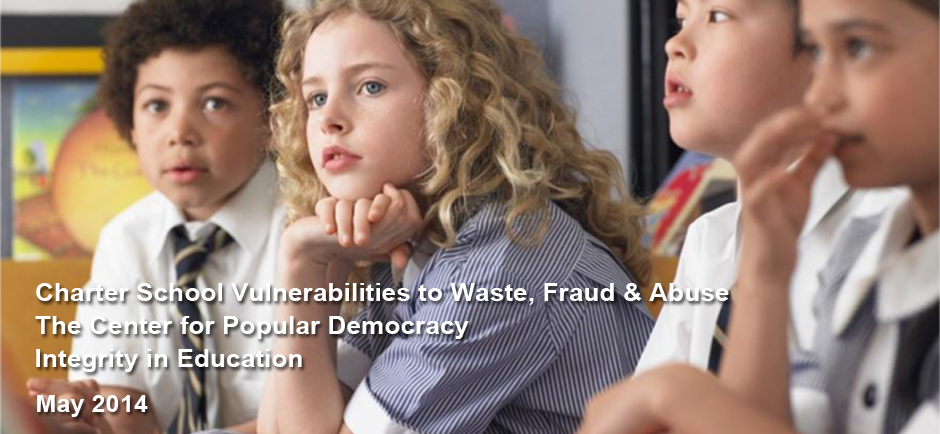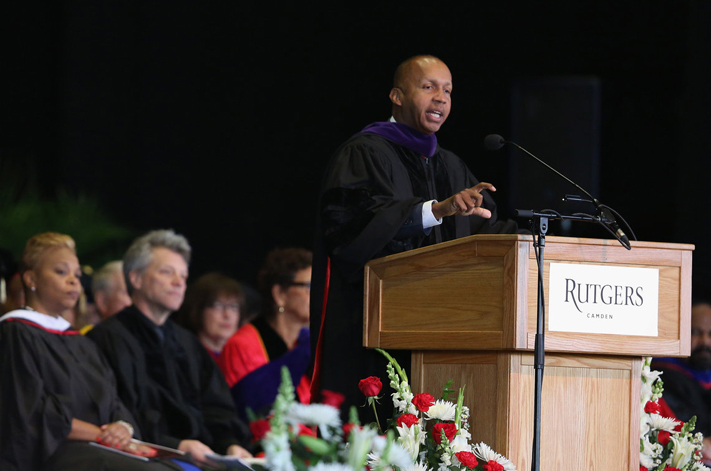Project Description
Charter School Vulnerabilities to Waste, Fraud & Abuse

The Center for Popular Democracy is a nonprofit organization that promotes equity, opportunity, and a dynamic democracy in partnership with innovative base-building organizations, organizing networks and alliances, and progressive unions across the country.
Integrity in Education is a nonprofit organization dedicated to restoring integrity in education. Integrity in Education exists to shine a light on the people making a positive difference for children, and to expose and oppose the corporate interest groups standing in their way.
This is report is available at www.integrityineducation.org and www.populardemocracy.org.
Preamble
The purpose of this report is to echo the warning issued by the OIG and to inform the public and lawmakers of the mounting risk that an inadequately regulated charter industry presents to our communities and taxpayers. Our examination, which focused on 15 large charter markets*, found fraud, waste, and abuse cases totaling over $100 million in losses to taxpayers. Despite rapid growth in the charter school industry, no agency, federal or state, has been given the resources to properly oversee it. 4 Given this inadequate oversight, we worry that the fraud and mismanagement that has been uncovered thus far might bejust the tip of the iceberg. Our hope is that lawmakers will use the information and concrete recommendations that we outline in this report to pass meaningful oversight legislation.
$100 million includes: 1) $51,146,094.65, federal prosecution of charter official/staff completed. 2) $33,400,000, state agency audit finds violation of federal law by charter official/staff. 3) $30,575,143.76, state agency audit finds violation of state law by charter official/staff. 4) $1,161,887.93, state agency audit finds violation of federal and state law by charter official/staff. 5) $19,550,489, charter official/staff is indicted by a federal grand jury. 6) $150,000, charter official/sta ff criminal prosecution in progress. 7) $20,000, charter official/staff is arrested and admitted to fraud. Total: $136,003,615.34
Introduction
Today, there are an estimated 6,400 charter schools enrolling over 2.5 million students.8
To understand why there are so many problems in the charter industry, one must understand the original purpose of charter schools. Lawmakers created charter schools to allow educators to explore new methods and models of teaching. To allow this to happen, they exempted the schools from the vast majority of regulations governing the traditional public school system. The goal was to incubate innovations that could then be used to improve public schools.9 The ability to take calculated risks with small populations of willing teachers, parents, and students was the original design. With so few people and schools involved, the risk to participants and the public was relatively low.
But today, as the charter sector grows far faster than originally envisioned, the risks are high and growing, while the benefits are less clear. Even relatively pro-charter organizations like the Center On Reinventing Public Education recognize that the regulatory foundation upon which the charter industry was built began from a place of insufficiency. In their analysis of charter oversight law, they found that “only minimal attention was paid to the question of how to oversee these new schools; frequently governments delegated charter school authorization as a side task to offices already burdened with other activities.”10 This is not an uncommon occurrence in our nation’s history. In the past — in some cases, our very recent past — industries such as banking have outgrown their regulatory safety nets. Without sufficient regulations to ensure true public accountability, incompetent and/or unethical individuals and firms can (and have) inflict great harm on communities.
This report will bring into focus some of the consequences of having inadequate charter regulations. We focus on just one symptom – the growing problem of fraud, waste, and abuse perpetrated by some charter school operators. The problem is pervasive; our search, despite being limited to fewer than half of the states with charter schools, found over $100 million in public tax funds lost to waste, fraud, and abuse.
The Growing Issue of Charter Operator Fraud and Mismanagement
- Charter operators using public funds illegally for personal gain;
- School revenue used to illegally support other charter operator businesses;
- Mismanagement that puts children in actual or potential danger;
- Charters illegally requesting public dollars for services not provided;
- Charter operators illegally inflating enrollment to boost revenues; and,
- Charter operators mismanaging public funds and schools.
Charter Operators Using Public Funds Illegally for Personal Gains
- Masai Skiefs, former CEO of the Harambee Institute of Science Technology Charter School in Pennsylvania, who pled guilty to stealing $88,000 for various purposes, including a down payment on a house;11
- William and Shirley Pierce, former operators of Right Step Academy Charter School in Minnesota, who were sentenced to 37 and 30 months in federal prison, respectively, for using public dollars for a Caribbean cruise vacation, $17,561.87 to pay off personal credit card debt, and $11,125.00 to purchase season tickets to the Minnesota Timberwolves12, among other things;
- Joel Pourier, former CEO of Oh Day Aki Heart Charter School in Minnesota, who embezzled $1.38 million from 2003 to 2008. He used the money on houses, cars, and trips to strip clubs. Meanwhile, according to an article in the Minneapolis Star Tribune, the school “lacked funds for field trips, supplies, computers and textbooks.”13 A judge sentenced Mr. Pourier to 10 years in prison.14 Given the number of years, and the severity of the fraud, over a million dollars might have been saved had there been adequate charter oversight.
'The theft of resources from Michigan’s children will not be tolerated,” said Schuette. 'We must root out corruption at all levels of government to ensure the public is served. Nobody will get a free pass when they break the law.'
To prevent this type of fraud from occurring, there are a number of steps lawmakers can take. For example, charter school governing boards should be required to include representation from the school’s educators and parents, and relatives of school administrators or anyone associated with a charter management company should be barred from serving on a school’s governing board. Schools should also be required to have internal financial controls that are considered best practices in non-profit management, to insure internal oversight of expenditures. Local or state charter school authorizers should be funded and required to ensure that these controls are in place.
Appendix A of this report includes excerpts from source documents which detail the various ways charter operators have used charter funds for personal gain.
School Revenue Used Illegally To Support Other Charter Operator Businesses
With increased transparency and tighter regulations governing self-dealing, much of this type of operator fraud can be prevented. Appendix B of this report includes excerpts from source documents which detail the various ways charter operators have used charter school revenue to illegally support their other personal businesses.
Mismanagement That Puts Children in Actual or Potential Danger
Another situation occurred at the Paterson Charter School in New Jersey. An investigation conducted by the Department of Education found that more than 75 percent of the school’s employees had not undergone the required criminal background checks.18 Similarly, the Department of Education found that the Mercer Arts Charter High School, also in New Jersey, was not providing a safe and orderly education environment for its students.19
Across the country in California, the San Diego Unified School District found a similar problem. The District cited the A. Phillip Randolph Leadership Academy Charter School for “not adequately supervising students.”20
Charter oversight rules that inoculate against these types of mismanagement cases are sorely needed. As is discussed in the ‘recommendations’ section of this report, we believe there is a need to task and fund a dedicated state-level charter school and charter authorizer oversight office that employs investigators in a ratio of 1 investigator to 10 charter schools. Especially in situations where student safety is concerned, setting up a system of preventive monitoring is key. When investigators are appropriately staffed, they can catch problems before they turn into casualties. Appendix C of this report includes excerpts from source documents which detail the various ways charter operators have put children in real or potential danger.[/fusion_builder_column]
Charters Illegally Requesting Public Dollars for Services Not Provided
Where there is little oversight, and lots of public dollars available, there are incentives for ethically challenged charter operators to charge for services that were never provided.
A particularly egregious example comes from the operator of the Cato School of Reason Charter School (Cato) in California. According to an investigation conducted by the California State Auditor, Cato registered and collected millions of taxpayer dollars for students who were actually attending private schools.21 Another example comes from New Jersey. State officials shut down the Regional Experiential Academic Charter High School after the state found, according to report in the New York Times, “a wide range of problems, including failure to provide special education students with the services required by state and federal law.”22 In Minnesota, as was reported in the Star Tribune, the superintendent of the Community School of Excellence Charter School “improperly directed staff members to enter or have students enter lunch codes for meals that were not eaten.”23
As is the case with the other types of fraud, this type of fraud could be prevented with increased transparency, monitoring of services and regular public reporting. Appendix D of this report includes excerpts from source documents which detail the various ways charter operators illegally requested public dollars for services that they did not provide.
Charters Operators Illegally Inflating Enrollment to Boast Revenues
School by the Fiscal Crisis and Management Assistance Team, a state agency, could not find evidence that a number of students existed.26 In Pennsylvania, as reported in the Philadelphia Inquirer, “Curtis Andrews, chief executive of the now-defunct Center for Economics and Law Charter School in Southwest Philadelphia, was sentenced in 2006 to 33 months in federal prison for defrauding the school district of $206,554 by devising a scheme to inflate student enrollment. He agreed to make full restitution as part of his guilty plea.”27
Charter schools should be required to submit monthly enrollment numbers, both to prevent this type of inflation, but also to ensure that adequate funding is being provided—or moved if students exit the school. The governing board should approve these enrollment reports and any irregularities should be immediately reported to authorizers. Governing boards should be held accountable for the accuracy of reports. Without regular audits, it is very likely operators will continue to illegally inflate their enrollment. Appendix E of this report includes excerpts from source documents that detail various cases of charter operator’s illegally inflating their enrollment.
Charter Operators Mismanaging Public Funds and Schools
- ABC Charter Middle School in California. An audit by the Los Angeles Unified School District found that “the lack of oversight by both the school’s management and board members led to significant control weaknesses in cash management, payroll, and financial accounting and reporting.”28
- Sunshine Academy Charter School in Florida. As reported in the Miami Herald, Broward County prosecutors found that, “the record keeping at the school and oversight of the school by the board of directors was virtually nonexistent…[and that] the school appears to have been poorly run.”29
'This is a heck of a mess… Closed or not, the leadership of this school must be held responsible, and the money must be returned to the people of Ohio.'
In order to avoid more losses to taxpayers, lawmakers must pass laws that establish some professional qualifications or standards for charter operators and officers.
Appendix F of this report includes excerpts from source documents that detail various cases where charter operators ran their schools poorly, which resulted in taxpayer money being lost.
Increased Recognition of the Need for Greater Charter Accountability & Oversight
In Minnesota, the birthplace of the charter industry, lawmakers passed a new charter accountability law in 2009. This was a response to a growing consensus, as a recent article in the Twin City Pioneer Press put it, “that Minnesota had too many charter monitors, themselves subject to not enough monitoring. Some were way too eager to sign off on new schools – and too reluctant to close ones that did not deliver.” In 2013, after several charter operators were caught stealing public funds, Hawaii’s state legislature repealed their charter school law and passed a new law that mandated that the state’s 33 charter schools sign an annual contract with the charter school commission to hold them accountable in three major areas: finances, organization and academics.31 In April of 2014, Ohio State Senator Schiavoni and House Representative Carney introduced legislation designed to increase transparency and accountability for public records and taxpayer dollars. The bill was in response to an Akron Beacon Journal investigative report which revealed that over 100 charter schools contacted by the paper failed or refused to provide even basic information including school board contact information or board meeting schedules,.32 Similarly, several charter reform bills were introduced in Illinois during the 2014 legislative session.33
The federal judiciary and state regulators are also sounding the alarm for improved charter oversight. In 2009, following the sentencing of a charter school operator to more than three years in prison for plundering its coffers, a federal judge called for more scrupulous government oversight of taxpayer-funded charters so “this type of criminal activity is not allowed to be repeated.”34 Five years after the Pennsylvania federal court judge made that point, Pennsylvania’s Auditor General Eugene DePasquale held a series of public meetings to explore ways to improve accountability, effectiveness and transparency of charter schools.35 In 2010, the Utah Office of the Legislative Auditor General found lapsesin the financial reporting processes of several charter schools and called for better fiscal policies and enforcement by the State Charter School Board.36
The Federal Department of Education’s Office of Inspector General (OIG) has also recognized the need for improved charter oversight, as referenced earlier. In their fiscal year 2014 report on Management Challenges, the Department specifically highlights the problem of “fraud perpetrated by charter school officials, and internal control weaknesses in the Department’s oversight processes.” In other words, the OIG acknowledges that they have yet to come up with an effective mechanism to disrupt the high level of fraud being perpetrated by charter operators.37 Yet even with the few regulatory tools available to them, between January 2005 through September 30, 2013 the OIG opened 62 charter school investigations, resulting in 40 indictments and 26 convictions of charter school officials.38
Still, most states do not have comprehensive laws that can deter charter operators from engaging in fraud and mismanagement before they harm students and taxpayers. Our analysis of these fifteen states suggests that fraud and mismanagement continues, and that adequate regulation and oversight remains elusive.
Charter Oversight Recommendations
Oversight
- Establish an Office Dedicated to Charters: All states should task and fund an Office of Charter Schools (‘Charter Office’ or ‘Office’) to provide oversight of performance and effectiveness of all charter schools and charter authorizers.
- Authority to Prevent & Catch Bad Actors: The Charter Office should have the statutory responsibility, authority, and resources to investigate fraud, waste, mismanagement and misconduct. This includes the authority to refer findings to the district attorney with jurisdiction or to the Office of the Attorney General or to any other appropriate law enforcement agency for prosecution if the Office discovers or receives information about possible violations of law by any person affiliated with or employed by a charter authorizing entity or charter school entity.
- Adequate Resources: The Charter Office must have an appropriate level of staffing to fulfill their mission. The ratio of charter schools to full-time investigators employed by the Office should not exceed ten to one.
- Payment Authority: The Charter Office should have the power to put a hold on the distribution of funds to the charter authorizing entity or charter school entity.
- Authority to Initiate Corrective Action: The Office should have the power to affirm, reverse or otherwise adjust charter grants, renewal or amend decisions made by charter authorizing entities if charters entities are found to be in violation of state or federal law. The Office should also have the power to revoke the chartering authority of charter authorizers.
- Require charter schools to be independently audited on an annual basis, with publication of such audits available online at the charter school’s website;
Transparency
- Amend state charter law to explicitly declare that charter schools are public schools, and are subject to the same non-discrimination and transparency requirements as are other publicly funded schools;
- Require that each charter school’s original application and charter agreement be available to the public online, through the websites of both the individual school, and the charter authorizer;
- A full list of each charter school’s governing board members, officers, and administrators with affiliation and contact information, should be available on the school’s website, as well as from the authorizer;
- Require members of charter school governing boards, charter school administrators, charter school employees, as well as public officials to file full financial disclosure reports, as well as to report on any potential conflicts of interest, relationships with management companies or other business dealings with the school, its management company or other charter schools. These reports should be similar to or the same as the reporting requirements of traditional school district Board members. Make these documents available to the public online through the charter’s authorizer;
- Require minutes from charter school governing board meetings, the school’s policies, and information about staff to be made available on the charter school’s website;;
- Require charter schools to be fully compliant with state open meetings/open records laws, with compliance monitored by authorizers. Failure of schools to release documents pertaining to governing board meetings, school policy and data, or to allow members of the public to file formal freedom of information requests to obtain these documents must be swiftly addressed and corrected by the authorizer;
- Charter school financial documents should be made available to the public annually, on the authorizer’s website. These documents should include detailed information about the use of both public and private funds by the school and its management entities. These reports should include full disclosure of the sources of private funds, and the duration of commitments of private funds;;
- Require disclosure of all vendor or service contracts over $25,000 and prohibit any vendor or service contracts to any entity in which the charter school operator or a member of the governing board has any personal interest.;
Governance
- Require charter school governing boards to be elected, with representation of parents (elected by parents), teachers (elected by teachers) and in the case of high schools, students (elected by students). Non-parent/teacher/student members of the governing board should be required to be residents of the school district in which the school/s operate;
- Require charter school governing board members to live in a geography that is close in proximity to the school/s physical location;;
- Hold members of a charter school governing board—like members of a publicly elected school board—legally liable for fraud or malfeasance occurring at the school or schools that they oversee;
Conclusion
We agree with the OIG’s assessment and believe their point that affirmative measures must be taken is especially important. Whether one uses the OIG’s assessment to support their case for charter oversight reform or the volume and variety of mismanagement and fraud cases that are delineated in this report, it is clear that the laws governing the charter industry are inadequate at preventing fraud and mismanagement. While some argue that the system is working, as evidenced by the large number of convictions, it is clear that the system is not working.
+ Emphasis added
Over 20 years of lax charter oversight, and the resulting fraud and mismanagement that has accompanied it, is all the proof we need that the charter industry is incapable of self-policing. While some authorizers and some charter organizations may be well run and offer strong accountability mechanisms, clearly others are not. The public deserves common-sense laws that protect their children and their tax dollars from incompetent or unscrupulous charter operators. The debate in our legislative halls should not be whether or not to regulate the industry, but how, and how soon.












